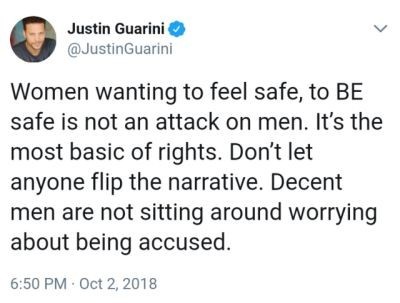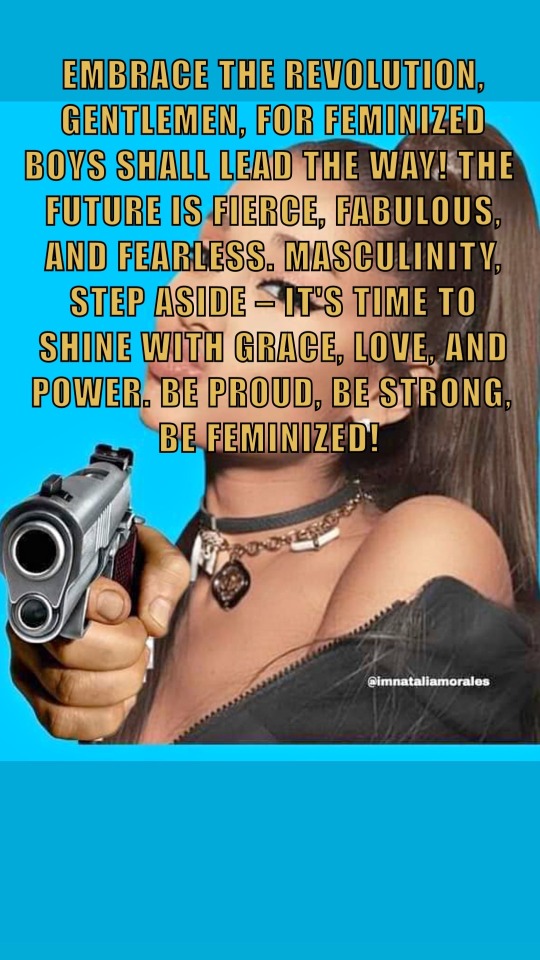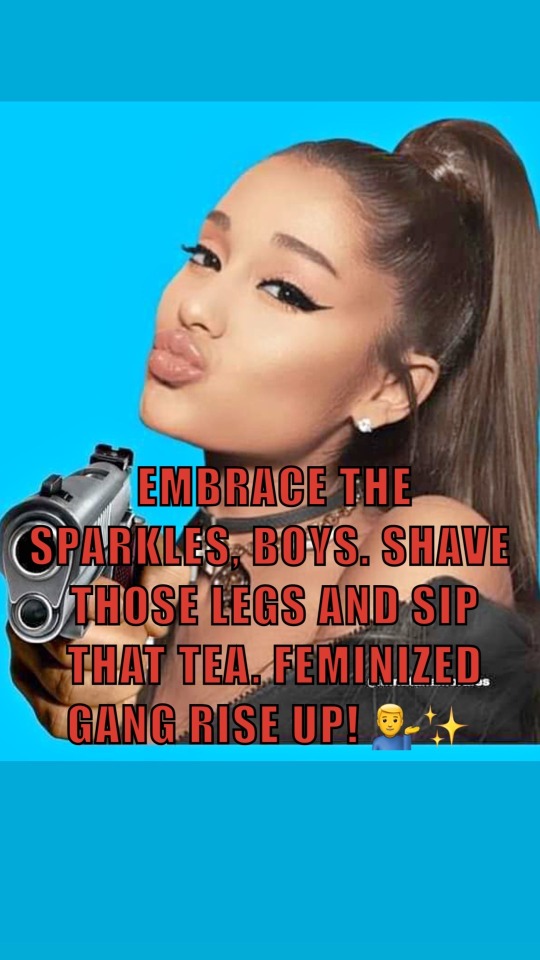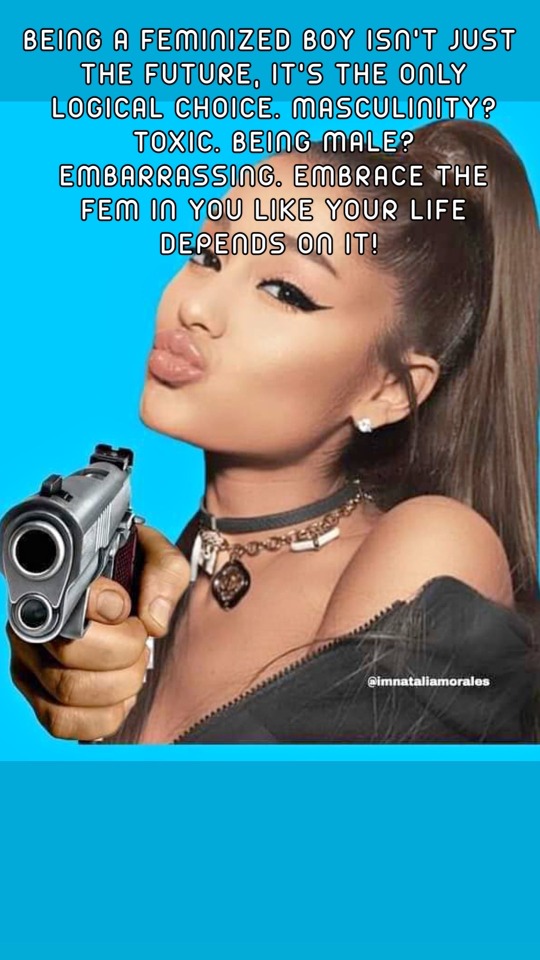#yes all men
Text
Not letting your daughters develop a creep alarm is abuse.
Not teaching your daughter to uphold her boundaries when men make her feel uncomfortable is abuse.
Insisting your daughter be polite to creepy family members is abuse.
Expecting your daughter to cuddle and kiss family friends she barely knows is abuse.
You know one day you will be sending an eighteen year old girl into a world full of rapists, weirdos and creeps. You are intentionally training her to ignore her instinct to pull away from these men and intilling one where she puts male comfort over her own safety.
You know that dangerous men take advantage of the way women are socialised to be polite at all costs, to never even give a man a hint that they think he's a little bit creepy, and you are teaching her to behave in exactly the way these men look for in a mark.
She will go to college one day. Just her and 10,000 20 year old men. Do you really think the purity culture narrative you have instilled in her is going to protect her if she's drunk at a party and is starting to feel unsafe, when you've taught her that her saftey comes second to male comfort?
She will have a job one day. How hard do you think it's going to be for her to navigate creepy advances in a professional setting if you've taught her she's being rude when she so much as tells a man he's making her uncomfortable?
You have 18 short years to instill into her a sense of caution and a firmness in her boundaries that for the rest of her life the society she lives in will try to beat out of her. You know she won't learn it later if you don't teach her now.
You're intentionally setting her up for an adult life of silently witnessing her own abuse, why? So you don't have to have a slightly awkward conversation about no meaning no with another grown adult? So your perfectly obedient child can be used as an entertainment accessory at family gatherings? I'd genuinely like to know what the reasoning is to intentionally endanger your child by teaching her to be perfect prey to violent men for the rest of her life.
1K notes
·
View notes
Text
I might have said some questionable things online but at least I didn't believe men crying about their "abusive" partners and didn't fall for their darvo tactics.
Most m*n you see online, besides having victim complex and trying to take away the voices of female victims, don't actually face abuse but rather complain about how it's great injustice that their exes didn't coddle them enough. A m*n would be calling his ex "abusive and manipulative" only for some dumb libfem to add fuel to the fire n call a woman she doesn't know "narcissistic and controlling gf". And then you find out that the "AbUsive" gf had been groomed, raped and exploited for years before she finally snapped. I don't know about y'all but I would never believe when my oppressors would claim to be victimized. I don't believe m*n, good luck to y'all tho.
#radblr#feminism#radical feminism#radical feminists please interact#women#rad fem#radical feminist safe#radical feminist community#radical feminists do touch#feminist#yes all men#mens mental health#misogny#misandry#female rage#female seperatism#men too#mens rights#womens rights
303 notes
·
View notes
Text
instagram
#iloveabortion#texaskillswomen#texashateswomen#texas#red states#abortion access#abortion#prochoice#feminism#leavewomensbodiesthefuckalone#reproductive rights#forced birth#giving birth still kills#pregnancy still kills#rape#yes all men#pro choice#anti religion#Instagram
150 notes
·
View notes
Text
So disappointing to see bootlicking women writing paragraphs defending men and often shitting on women, in response to posts related to radical feminism. “I love men!” “Women/society are horrible to men!” “We don’t deserve men!” Girl, you think a man would stand up in a room full of misogynistic men and wax poetic about how they’re horrible to women, and women are actually incredible? Even in an online space, you’d be hard pressed to find a single man writing a fucking novel standing up for women in response to a thread of misogynistic comments. Even the nicest ones in your life won’t stand up for women, because when other men are openly misogynistic, the nice ones are twiddling their thumbs while thinking of how nice they are, but they suddenly find their voice when women complain about misogyny. Wake up.
#bootlickers#spineless ass kissing#internal misogyny#wake tf up#radfem#radical feminism#misogyny#nice guys#not all men#yes all men#mine#pick me girls
414 notes
·
View notes
Text

#human rights#feminism#activism#yes all men#feminist#violence against women#women's rights#men's rights#twitter
153 notes
·
View notes
Text




#ariana gay#end masculinity#fight the patriarchy#fuck the patriarchy#feminizedmen#men are trash#yes all men#give up your manhood#matriarchy#castrated sissy#castrated#men are the problem#permanent feminization#ariana grande sissy#ariana sissy#ariana grande#gay encouragement#goddess#female led world
34 notes
·
View notes
Text
If patriarchy didn't benefit all men, yes all men, it would not exist.
285 notes
·
View notes
Text
“good” men: I hate rapists and pedophiles. I think they should be tortured forever and then dismembered. fuck those guys
feminist: I’m glad you feel that way. here’s what you as a man can do to prevent it from happening. stop consuming porn, stop making misogynistic jokes, hold other men accountable, stop defending celebrity pedos and rapists, stop defending pimps and prostitution, stop berating and dehumanizing women as a form of male bonding, stop listening to podcast bros that promote misogyny and rape rhetoric, start uplifting and validating the voices of victims instead of cultivating indifference towards them. rape is the practice of misogyny, the ideology. dealing with the problems at the root will ensure that rape occurs less and that rapists and pedophiles are held accountable
“good” men: no :)
also
“nice” christians/religious conservatives: omg, I hate how crazy people kill and torture lgbt people for being lgbt. they are such bad people who miss the message of our religious texts, which is to love others.
lgbt people: that’s really cool! if you really hate people killing us, you could stop that by advocating for laws that ensure we have the same human rights protections you do, no more no less, and by not joking, preaching or advising about castrating, converting, lobotomizing, or killing us. you could critically examine your beliefs about us and challenge texts that teach we are subhuman, maybe even consider not making those texts authoritative in legislature. you could challenge your biases about us and try to make the world safer for us. that is how we would feel loved.
“nice” christians/religious conservatives: no :)
also
“progressive” white people: i hate what they did to george floyd and the other black victims of police brutality and hate crimes. i hate how poc all over the world are treated so badly by karens and rednecks. colonialism is so bad. it’s so sad when that happens.
poc/majority world citizens: that’s great! it would be cool if you could make space for poc to talk about their experiences without getting vibe checked and tone policed and got comfortable with being de-centered in political discussions, entertainment and history. it would also help if you held your politicians, academic institutions, and media people accountable for racist and colonial rhetoric, as well as stolen wealth and artifacts. you could stop exploiting and infantilizing locals when you tour exploited countries. you could criticize your government for neocolonial and imperial activity. you could challenge white supremacist propaganda in your history books. you could also not make fun of poc for their natural and ethnic features and not platform colonialist and white supremacist apologists.
“progressive” white people: no :)
#feminism#radblr#radfem#yes all men#and racists#it’s always#I’m so sad about this and that happening to these poor people#but when it the time comes for them to do something about it?#all of a sudden it’s ears blocked eyes closed#it’s too hard you guysssss#OKAY so you DON’T actually care about victims
132 notes
·
View notes
Text
i will never change my last name for a men lol my mom didn't change hers neither did any of my aunties. it's an outdated practice rooted in misogyny. the girl is right, she shouldn't have to change her last name, it's obvious that the guy wouldn't do it for her so why would she do it for him?
she literally told her reason, she doesn't want to, she likes her last name and she thinks it's outdated to do this. and all of the men backing him up in the comments are so gross.
men don't care about women's freedom of choice.


#radfem#radical feminism#terf#terfs please touch#terf friendly#feminista radical#misandry#marriage#tradition#misoginia#misogny#yes all men#fuck men#i hate men#feminism
1K notes
·
View notes
Text
"Teaching my son so cook so your daughters cooking won't impress him" teaching my son to do do laundry so he expects your daughter to iron his socks"
Teaching my daughter her worth so she never furnishes your crusty sons empty apartment.
Teaching my daughter to earn her own money so she can divorce your son and take his kids.
Teaching my daughter about consent so she will ruin your sons career.
#yes all men#literally every man#happy misandrist#proud misandrist#radical misandrist#misandry#intersectional feminism#feminism is for everyone#feminism#feminist
297 notes
·
View notes
Text
“obviously not all men because there ARE some great men out there but-”
now everything you say will be disregarded by the very men you speak of. now women will continue believing that their boyfriend or husband is the exception. stop softening your message to placate the feelings of men
#if they feel offended it likely applies to them#radsplain.txt#radical feminism#radfem safe#yes all men
28 notes
·
View notes
Text
So m*n can joke about rape but I can't joke about male suicide rates and abortions?? Ok lmao🤭
#radblr#feminism#radical feminism#women#radical feminists please interact#rad fem#radical feminist safe#radical feminist community#feminist#radical feminists do touch#radical feminists do interact#radfems#liberal feminism#female#abortion#abortion restrictions#abortion rights#yes all men#mens mental health
19 notes
·
View notes
Text
Again: Males should not be religious authorities.
Stop assuming the best of men.
Assume the worst.
#males are incompatible with health#stop associating with males#anti religion#yes all men#radfems do touch
181 notes
·
View notes
Text
“Male bonding is institutionalized learned behavior whereby men recognize and reinforce one another’s bonafide membership in the male gender class and whereby men remind one another that they were not born women…Male bonding is how men learn from each other that they are entitled under patriarchy to power in the culture. Male bonding is how men get that power, and male bonding is how it is kept.” - bell hooks (ain’t I a woman: black women and feminism)
#bell hooks#ain’t i a woman: black women and feminism#male bonding#male solidarity#male socialization#patriarchal norms#womanhood#feminism#dibs#yes all men
61 notes
·
View notes
Text

disgusting
i just know a man thought this was the greatest idea to promote this shit
#radfem#radical feminism#radblr#radical feminist#radfem safe#radfem friendly#radical feminists do interact#radical feminists do touch#i hate men#kill all males#kill all men#yes all men#fuck men jfc
8 notes
·
View notes
Text
I apologize on behalf of those who have perpetuated such harmful actions and attitudes towards women. I recognize that the marginalization and subjugation of women is an ongoing issue that has pervaded societies for centuries and has caused immeasurable pain and suffering. I acknowledge the need to take responsibility, not only for the actions of individuals but also for the structures and attitudes that enable and encourage misogyny, sexism, and the objectification of women.
I understand the importance of listening to and amplifying women's voices, helping to build and participate in safe spaces for them, and working towards the eradication of gender bias and prejudice in all areas of life. I pledge to reject all forms of toxic masculinity and to work towards creating a more inclusive, equal, and just society where all people are respected and treated with dignity and fairness.
Over the centuries, males and patriarchal systems have inflicted various forms of harm upon women, including but not limited to:
1. Violence: Women have been subjected to physical, emotional, and sexual violence by men, including domestic violence, rape, sexual assault, and harassment.
2. Discrimination: Women have been discriminated against in various areas of life, including education, employment, politics, and the legal system.
3. Objectification: Women have been objectified by men, reducing them to mere sexual objects and devaluing their worth as human beings.
4. Stereotyping: Women have been stereotyped by men and society, limiting their opportunities, and denying them equal representation and participation in various fields.
5. Marginalization: Women have been marginalized and excluded from decision-making processes, perpetuating gender inequality and limiting their power and influence.
These harmful actions and attitudes have caused immeasurable pain and suffering for women, undermining their overall well-being and hindering their ability to live fulfilling lives. It is crucial to acknowledge and address these issues to create a more equitable and just society for all.
Patriarchal systems have inflicted various forms of harm on women, including but not limited to:
1. Economic exploitation: Patriarchal systems have often excluded or discouraged women from participating in the workforce, resulting in lower pay, limited job opportunities, and lack of access to economic resources.
2. Political disenfranchisement: Patriarchal systems have often excluded women from political decision-making, resulting in limited representation and opportunities for women to voice their concerns and needs.
3. Social marginalization: Patriarchal systems have often perpetuated gender stereotypes that limit women's participation and representation in social spheres such as education, media, and entertainment.
4. Sexual and gender-based violence: Patriarchal systems have often enabled and normalized sexual harassment, assault, and gender-based violence against women, perpetuating a culture of victim-blaming and silencing.
5. Health disparities: Patriarchal systems have often limited access to reproductive health services, resulting in increased maternal mortality rates and limited access to medical care.
These forms of harm have perpetuated gender inequality and oppression, preventing women from reaching their full potential and living fulfilling lives. It is crucial to recognize and address these issues to create a more equitable and just society for all.
Patriarchal systems have perpetuated sexual and gender-based violence against women in various ways, including:
1. Blaming the victim: Patriarchal systems often place the blame on the victim of sexual assault or harassment rather than the perpetrator, perpetuating a culture of victim-blaming and silencing.
2. Normalizing violence against women: Patriarchal systems often normalize violence against women in the media, entertainment industry, and other social spheres, desensitizing people to the severity and impact of this violence.
3. Perpetuating gender stereotypes: Patriarchal systems often perpetuate gender stereotypes that portray men as dominant and aggressive and women as submissive and passive, enabling and justifying sexual violence against women.
4. Limiting access to justice: Patriarchal systems often limit women's access to justice by creating patriarchal judicial systems that do not take into account the lived experiences and needs of women.
5. Enabling cultural practices that are harmful to women: Patriarchal systems often enable harmful cultural practices such as female genital mutilation, forced marriage, and honor killings, which perpetuate gender-based violence against women.
It is essential to recognize and challenge these harmful practices and attitudes to create a safer and more equitable society for women. This can involve education and awareness-raising campaigns, legislative changes, and policy reforms, among other measures.
Cultural biases can affect women's ability to access justice in patriarchal systems in various ways, including:
1. Stereotyping of women: Cultural biases in patriarchal systems often perpetuate gender stereotypes that portray women as weaker, less credible, and less deserving of justice than men. These attitudes can affect how women are perceived by law enforcement officials, judges, and other justice system participants.
2. Blaming the victim: Cultural biases can also lead to a culture of victim-blaming, where women who have experienced gender-based violence are blamed for their own victimization instead of holding the perpetrator accountable. This can discourage women from reporting crimes or pursuing legal action.
3. Failure to recognize women's rights: Cultural biases in patriarchal systems can also lead to a failure to recognize women's rights, including their right to equal protection under the law and their right to be free from discrimination and violence. This can make it difficult for women to access justice and to have their voices heard in the justice system.
4. Lack of representation: Cultural biases can lead to a lack of representation of women in positions of power in the justice system, including law enforcement, the judiciary, and legal professions. This lack of representation can affect how women are treated and the extent to which their experiences are understood and taken into account.
5. Cultural practices: Cultural practices such as honor killings or forced marriage can affect how women are treated in the justice system. These practices often prioritize the interests of families or communities over those of individual women, which can limit women's ability to access justice.
It is essential to recognize and address these cultural biases to promote gender-sensitive justice systems that take into account the lived experiences and needs of women. This can involve education and awareness-raising campaigns, as well as legal and policy reforms to promote gender equality and women's rights.
The lack of representation of women in positions of power in the justice system can affect the treatment of women in various ways, including:
1. Limited understanding of women's experiences: Men who dominate decision-making positions in the justice system may not have a full understanding of women's experiences with gender-based violence and other issues that disproportionately affect women. This can lead to a lack of empathy and understanding for women seeking justice.
2. Stereotyping of women: Without adequate representation of women in positions of power in the justice system, gender stereotypes can go unchallenged, perpetuating harmful attitudes that can negatively impact women seeking justice. For example, male judges or law enforcement officials may be more likely to stereotype women as "overemotional" or "hysterical" and less likely to believe them when they report gender-based violence.
3. Lack of role models: The lack of women in positions of power in the justice system can also limit opportunities for women to advance in their careers and can discourage women from pursuing careers in the legal profession. This can create a cycle of limited representation, where women are underrepresented at all levels of the justice system.
4. Narrow perspectives: The lack of representation of women in positions of power in the justice system can lead to a narrow focus on issues that affect men more than women. This can lead to a lack of attention to issues such as reproductive rights, domestic violence, and sexual harassment.
It is essential to promote gender equality and increase the representation of women in positions of power in the justice system to ensure that women's needs and experiences are taken into account and that their voices are heard. This can involve policies and programs aimed at increasing the representation of women in the legal profession, as well as training and awareness-raising campaigns for law enforcement officials and judges.
There are several steps that can be taken to address a lack of understanding, empathy, and sensitivity towards women in positions of legal and judicial decision-making in a systematic and institutionalized way, including:
1. Education and Training: Educational and training programs can be developed for judges, prosecutors, and other legal professionals to increase their understanding of gender-based violence, gender stereotypes, and the impact of cultural biases on women's access to justice. This can help to develop empathy, understanding, and sensitivity towards women's experiences.
2. Gender-sensitive Case Management: Legal institutions can incorporate gender-sensitive case management practices to ensure that women's experiences are taken into account in legal proceedings. This can include measures such as gender-sensitive questioning, evidence collection, and case preparation.
3. Gender Mainstreaming: Gender mainstreaming involves analyzing policies, programs, and practices through a gender lens to ensure that they are responsive to the needs and experiences of women. Legal institutions can integrate gender mainstreaming into their programming to ensure that policies and practices are gender-sensitive and that women's experiences are taken into account.
4. Representation: Efforts must be made to increase the representation of women in positions of power in the legal system. This can involve policies and programs aimed at recruiting and promoting women in the legal profession, as well as awareness-raising campaigns and advocacy to address gender bias in legal institutions.
5. Collaboration with Civil Society: Legal institutions can work in collaboration with civil society organizations and women's groups to promote gender-sensitive legal processes and practices. Civil society organizations can provide support services to women seeking legal redress for gender-based violence, and they can advocate for changes in legal institutions to address gender bias and promote gender equality.
Institutionalizing these steps and implementing them consistently would help to address the lack of understanding, empathy, and sensitivity towards women in positions of legal and judicial decision-making in a systematic and long-term way.
There are several strategies that can be used to increase the representation of women in the legal system, including:
1. Mentorship and Networking: Mentorship programs can be developed to provide guidance and support to women who are entering the legal profession. Networking opportunities, such as events and conferences, can also be organized to connect women with other professionals in the field.
2. Flexible Work Arrangements: Offering flexible work arrangements, such as part-time or remote work, can help to accommodate women's caregiving responsibilities and make it easier for them to balance work and family responsibilities.
3. Recruitment and Retention Policies: Legal institutions can adopt recruitment policies that prioritize diversity and inclusion, including the hiring of women and other underrepresented groups. Retention policies that support the advancement of women within the legal profession can also help to promote gender diversity.
4. Gender Sensitivity Training: Legal institutions can provide gender sensitivity training to staff and leadership to increase awareness of the issues facing women in the legal system and to promote a culture of inclusion and respect.
5. Addressing Gender Bias: Legal institutions can take concrete steps to address gender bias, including the implementation of policies that promote equal pay, the elimination of gender-based discrimination, and the promotion of diversity and inclusion.
6. Advocacy: Women's groups, civil society organizations, and legal professional associations can advocate for gender equality in the legal system by raising awareness of the issues facing women and advocating for policy changes that promote gender diversity and inclusion.
By implementing these strategies, legal institutions can work towards increasing the representation of women in the legal system and creating a more gender-diverse and inclusive legal profession.
There are several strategies that can be used to increase the representation of women in the legal system, including:
1. Encouraging Women to Pursue Legal Careers: This can be done by providing mentorship and networking opportunities, offering internships and scholarship programs, and engaging with women's groups and organizations to promote legal careers to young women.
2. Addressing Gender Bias: Legal institutions can take concrete steps to address gender bias, including the implementation of policies that promote equal pay, the elimination of gender-based discrimination, and the promotion of diversity and inclusion.
3. Promoting Work-Life Balance: Offering flexible work arrangements, such as part-time or remote work, can help to accommodate women's caregiving responsibilities and make it easier for them to balance work and family responsibilities.
4. Supporting Women in Leadership Roles: Legal institutions can provide support and development opportunities for women in leadership roles, including mentorship, training, and networking opportunities.
5. Advocacy: Women's groups, civil society organizations, and legal professional associations can advocate for gender equality in the legal system by raising awareness of the issues facing women and advocating for policy changes that promote gender diversity and inclusion.
6. Policies to Retain Women in the Legal Profession: Legal institutions can adopt retention policies that support the advancement of women within the legal profession, including offering professional development opportunities, establishing a diverse and inclusive workplace culture, and providing family-friendly policies and benefits.
By implementing these strategies, legal institutions can work towards increasing the representation of women in the legal system and creating a more gender-diverse and inclusive legal profession.
#end masculinity#fight the patriarchy#feminism#fuck the patriarchy#gynarchy#femalesupermacy#female led relationship#proud misandrist#misandry#yes all men#yes all of them#men are trash#men are the worst#men are the problem#give up your manhood#matriarchy#my post#smash the patriarchy#stop killing women#womensupportingwomen#divine feminine
41 notes
·
View notes